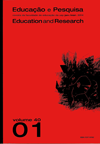Indicators of stress and coping in the context of inclusive education
DOI:
https://doi.org/10.1590/S1517-97022014000100009Abstract
Thanks to inclusive policies, school has been the main means of education for pupils with special educational needs (SEN). But the difficulties experienced in the implementation of such policies may contribute to the development of stress among teachers. Keeping this in view, this study has sought to identify stressors and levels of teacher stress and examine sociodemographic, personal, work and student variables, according to the presence of stress. Nineteen teachers of classes of 1st, 2nd and 3rd grades of primary education in public schools in Vitória city, Espírito Santo state, Brazil, working with classes with students with SEN, responded to Lipp's Inventory of Stress Symptoms for Adults, a questionnaire with variables of interest and six scales of stressors and coping, translated and adapted especially for this study. The large number of students and their behavioral problems were the most frequent stressors. With regard to inclusive education, the main results were work overload and the perception that the government is little concerned with providing support for work. However, it is noteworthy that the inclusion of pupils with SEN was a less cited factor and may not, thus, be the central variable for stress. Actually, teachers with stress identified more often the following cause: the perception of the public misunderstanding of the teaching work. Based on this finding, we suggest interventions to promote well-being among teachers.Downloads
Download data is not yet available.
Downloads
Published
2014-03-01
Issue
Section
Articles
License
Authors assume exclusive responsibility for the concepts expressed in their articles, which do not necessarily reflect the journal’s opinion.
Permission to photocopy all or part of the material published in the journal is granted provided that the original source of publication be assigned.
How to Cite
Indicators of stress and coping in the context of inclusive education . (2014). Educação E Pesquisa, 40(1), 127-142. https://doi.org/10.1590/S1517-97022014000100009



